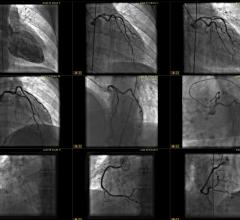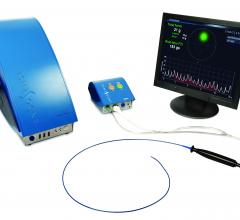Samsung Electronics America Inc. announced the Samsung Ugeo H60, the first ultrasound system integrating Samsung technology and design introduced to the U.S. medical imaging market. The Samsung Ugeo H60 ensures superior imaging performance and a sleek design that provides users with a fast, accurate and intuitive ultrasound experience.
Angiotech Pharmaceuticals Inc. announced that it entered into a definitive agreement to sell certain of its subsidiaries, comprising Angiotech's interventional products business, to Argon Medical Devices Inc., a portfolio company of RoundTable Healthcare Partners, for $362.5 million in cash consideration. Angiotech expects the transaction will close prior to the end of April 2013.
Archimedes IndiGo — the physician and patient decision-support tool created by Archimedes, Inc. — was chosen last summer as the risk-assessment engine for the new $100,000 mobile app challenge sponsored by the Office of the National Coordinator (ONC). As part of the U.S. Department of Health and Human Services' Million Hearts "Risk Check Challenge," the ONC invited developers to create a mobile app that would help consumers take a heart-health risk assessment, direct them to health-screening locations in their community and use the results to work with their doctor to develop a plan for improving their heart health.
Cardiac PET/CT represents a major advancement in cardiovascular diagnostics, offering significant clinical and ...

The American Society of Echocardiography (ASE) has released a list of five interventions whose appropriateness physicians and patients should discuss as part of Choosing Wisely, an initiative of the ABIM Foundation, along with Consumer Reports. Fifth on the list, they ask that patients and their doctors talk about the real need for a TEE if the patient’s clot treatment isn’t likely to be modified.
Terumo Cardiovascular Systems announced it has entered into a multi-year distribution agreement with Nonin Medical, Inc. Beginning May 1, 2013, Terumo CVS will distribute Nonin's Equanox Model 7600 Regional Oximetry System to adult and pediatric cardiovascular hospitals in the U.S. Nonin's direct sales force will focus on certain non-cardiovascular applications in those hospitals and applications in all other U.S. hospitals. Terumo CVS manufactures and markets medical devices for the global cardiac surgery market.
Crouse Hospital boasts a nationally recognized cardiac care center, providing a full range of interventional and diagnostic procedures for pediatric and adult patients in the greater Syracuse, N.Y., area. Its robust program requires state-of-the-art technology. Crouse recently implemented HealthView, a Web-based cardiovascular information system (CVIS) by Lumedx that streamlines clinical workflows and improves access to patient information across the care continuum.
SPONSORED CONTENT — Studycast is a comprehensive imaging workflow system that allows healthcare professionals to work ...
Atomic Energy of Canada Limited (AECL) will commence a 30-day planned shutdown for inspection and maintenance of the National Research Universal (NRU) reactor at Chalk River, Ontario, starting April 14, 2013. This planned shutdown, which AECL has advised will last until May 14, 2013, will result in an interruption in the supply of medical isotopes used in nuclear imaging procedures in the United States. Chalk River is one of the primary sources for the isotopes used in nuclear imaging radiopharmaceuticals.
A study led by researchers at the University of North Carolina indicates a newly approved blood thinner blocks a key component of the human blood clotting system and may increase the risk and severity of certain viral infections, including flu and myocarditis.
One of the leading complaints in the emergency department is chest pain and the timely detection of a heart attack is essential. The Johns Hopkins Hospital presented an abstract at the American College of Cardiology (ACC) conference in March that utilized VentraCor's VectraplexECG System. The abstract, entitled "New Cardiac Electrical Biomarker Measured on 12-Lead ECG Strongly Correlates With High Sensitivity Troponin in Patients Admitted to the Emergency Department to Rule Out Acute Myocardial Ischemic Injury," was presented by Larisa Tereshchenko, M.D., Ph.D., FAHA, of The Johns Hopkins Hospital.
Providing exceptional cardiovascular care for patients to achieve the best possible outcomes is the number one goal for ...
Continuing its commitment to provide best-in-class medical devices for the prevention of recurrent pulmonary embolism (PE), Argon Medical Devices Inc. launched the OptionELITE Retrievable Vena Cava Filter. The OptionELITE IVC Filter, designed by Rex Medical LP, provides the clinician with the same safe and trusted design now enhanced for ease of delivery and retrievability.
Toshiba America Medical Systems Inc. has introduced the Aplio 500 and Aplio 300 CV ultrasound systems to help clinicians more accurately and efficiently diagnose cardiovascular disease. Compact and easy-to-use, Aplio 500 CV and Aplio 300 CV deliver exceptional image quality and advanced technologies to improve patient diagnoses and treatment.
Siemens Healthcare has introduced a new version of its cardiovascular imaging and information system. From routine to advanced readings, the new version of syngo Dynamics helps streamline workflows and optimize clinical utilization.
Cardiac positron emission tomography (PET) is growing in popularity among cardiologists because it provides the ability ...
Corgenix Medical Corp. has announced that Atherotech Diagnostics Lab will carry its AspirinWorks Test for determining aspirin effect.
SunTech Medical has updated its line of automated blood pressure (BP) monitoring with the Tango M2 cardiac stress BP monitor. The new product provides accurate BP measurements during exercise and cardiac stress testing where noise and motion often make manual measurements difficult.
Endosense has announced that the results of its EFFICAS I prospective multi-center study have led to the development of guidelines for target and minimum contact force (CF), as well as minimum Force Time Integral (FTI), during the catheter ablation treatment of paroxysmal atrial fibrillation (PAF).


 April 08, 2013
April 08, 2013












